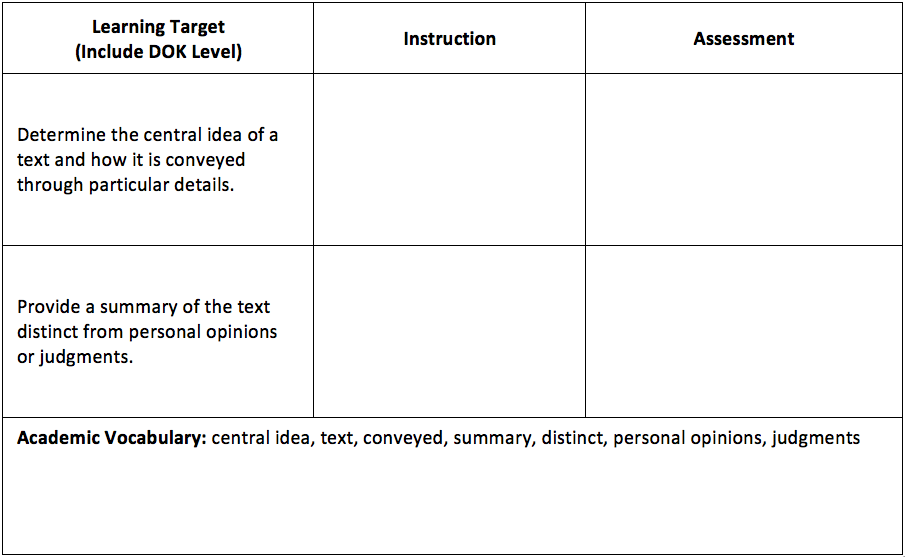With all of the published materials and frameworks available, teachers often ask why they should invest their time in unpacking standards. Consider the following:
- Teachers who do the work to unpack standards are the ones who understand them. It is through collaborative conversations that we come to collective clarity on what we want our students to know and be able to do. When teachers unpack standards in isolation they are likely to interpret the intent and rigor differently resulting in an educational lottery for students rather than a guaranteed and viable curriculum.
- Understanding all of the standards helps teachers wisely choose the essential or power standards. These are the standards guaranteed to all students at grade level.
- Identification of the depth of knowledge required of the standards leads to more thoughtful lesson design.
- Laser-like focus on the standards and team-created common formative assessments go hand-in-hand. When standards and assessments align it is easier to catch students quickly when they don’t understand and to provide extension when they do understand.
- The unpacking process keeps the focus on ALL students learning at high levels.
The process to unpack is simple and shouldn’t take much time once you are in the swing of things.
These are the steps in unpacking standards into learning targets:
- Read the standards as a team.
- Circle the verbs.
- Underline the nouns and noun phrases.
- Determine the number of targets found within the standards.
- Write as separate learning targets.
- Remember to keep the core language intact at all times.
- Do not omit any part of the standard.
- Determine the depth of knowledge required of the standard.
- Pull the academic vocabulary from the standard.
- Unpack all of the standards before digging into how the standards will be taught and assessed.
- Read all of the unpacked standards to determine the standards you will prioritize. These are often called power standards, essential knowledge, or big rocks.
- Remember: the standards we have determined as essential are the ones we are going to spend the bulk of our time teaching, assessing, re-teaching and reassessing. These are the standards we can’t imagine our students leaving our course of study or grade level without mastering.
- Prioritization does not mean elimination. The other standards will still be taught. They are good to know or nice to know but a student could still progress to the next grade or course without mastering them at a high level.
- Tom Schimmer reminds us that unpacking alone is not enough; we must repack, “With all of that, far too many teachers stop short of completing the process, which involves the repacking of standards when the verification of learning (summative assessment) is the primary purpose. Once a standard has been unpacked, the standard itself no longer exists unless the learners are asked to demonstrate their learning against the standard as a whole and not just the isolated skills that make up the standard. When it comes to meeting standards, the whole really is greater than the sum of its parts.”
It is essential that teacher teams become proficient in unpacking standards into learning targets so that that the pathway to mastery becomes evident for teachers and students.
Unpacking example:
Grade 6 Reading Standard for Literature: Common Core Standard 2
Determine a theme or central idea of a text and how it is conveyed through particular details; provide a summary of the text distinct from personal opinions or judgments.
Learning target 1: Determine the central idea of a text and how it is conveyed through particular details.
Learning target 2: Provide a summary of the text distinct from personal opinions or judgments.



Love this.
This is great information.
great !
Please share any researched based articles or educational articles on why unpacking the standards is important for instruction, more samples on how to unpack a standard and exemplar unpacked standards.
taporter@dallasisd.org
Great template to use for planning.
Jennifer, I am so happy that the template was useful for you and your team. Let me know how it goes!
Maria
Do all the MELCs need to be unpacked or combined? Why or why not?
what considiration must be taken in unpacking and combining the MELC?
It’s great help for us teachers..
Good way of describing, and pleasant article to get information about my presentation subject, which i am going to deliver in school.